- Home
- Mark Pryor
The Crypt Thief Page 10
The Crypt Thief Read online
Page 10
“I know how he’s doing it.”
“Who?” she asked. “Doing what?”
“The Scarab. Père Lachaise.” A grin spread across his face. “I know how he’s getting in and out without being seen.”
Claudia’s face appeared in the ragged gap. “How?”
“Underground. Like this. He’s found a way underground into the cemetery.”
“Merde, are you talking about . . .”
“The catacombs.” Hugo moved toward her. “I should have seen it before, it’s the only possible way.”
“You really think so?”
“It must be. There’s a hundred of miles of tunnels under Paris, going every which way. If there’s a sewer line running under the cemetery, or just a collapsed grave, he can get there from pretty much anywhere in the city.”
She nodded and looked past him into the hole. “And my bag?”
“Halfway across Paris by now,” he said. “Maybe we’ll get lucky and they’ll leave it at Père Lachaise for us.”
“You’re planning on going back there?”
“I am now,” Hugo said. “After all, our murderous bone thief will be back. He was frustrated last time, and his window of opportunity is closing.”
“Window? What window?”
“The moon.” Hugo took one last look into the hole at his feet before moving to the gap and squeezing out past Claudia. “The wondrous, light-giving moon.”
“But don’t the police have the place swarming with cops now? And if you’re right, how long before they find his secret route in?”
Hugo straightened up and looked at her. “I’ve been thinking the same thing. Which means either we’ll catch him very soon, or . . .” He trailed off.
“Or what?”
Hugo looked at his watch. “Dammit, we have to hurry.”
“Hugo, what’s going on?”
“He has to go back soon, maybe tonight, to finish whatever he started.”
“The rest of the skeleton.”
“Except he knows he’s not going to get the rest of Jane Avril’s,” Hugo said. “He has to know that.”
“So he goes back for a different one. And he has to go back to the cemetery, right, even though it’s risky for him.”
“He does,” Hugo said. “But who says he has to go back to that cemetery?”
“You think . . .”
“That’s why we need to get back. To find a map of those tunnels and catch him when he pops up tonight.”
“What about the Moulin Rouge?” she asked.
“Oh, right.” Hugo paused to think. “I’ll let Tom know about that connection. I have a sneaking suspicion that he’d be quite happy to spend a few hours poking around backstage there. Especially if his other choices are a rat-infested tunnel and a cemetery.”
Chapter Nineteen
Tom answered on the second ring, and Hugo was surprised at how alert his friend sounded. So much for having to wake him.
“Tom, it’s Hugo. I need your help with something.”
“Fire away.”
“Do you think we can find a map of the catacombs in the next hour or two?”
“You mean the tourist site? With all the bones and skulls and shit?”
“No, the real catacombs. I know they exist, I read about them years ago. Apparently there’s a group of people, catafiles, who go exploring them.”
“Yeah,” said Tom. “And the cops sent to chase them are called cataflics. So what?”
“So I think that’s how he’s getting into Père Lachaise. That’s why he doesn’t appear on the security cameras and why the dogs couldn’t find him. He disappears down a manhole or into a crypt where there’s a hole leading into the catacombs.”
“I like it,” Tom said. “But what’s the hurry? He won’t go back there tonight, not after his last visit.”
“I don’t think he’s going there ever again,” Hugo said. “He’s planned this all out meticulously, so I think he’s got a plan B.”
“Which is?”
“He’ll use the catacombs to get into another cemetery.”
“Why would he do that?”
“Claudia told me she has a friend who works with the forensic anthropologists the French police use. He only took half of Jane Avril’s skeleton. I think he wants a complete one, and so he needs to find another grave.”
A long silence on the phone told Hugo that Tom already knew about the half skeleton. “Why tonight?”
“For some reason he doesn’t like working in the moonlight. Makes sense when you’re digging up a grave in the middle of the night, wouldn’t you say?”
“Don’t be sarcastic. I meant why doesn’t he just wait until the next new moon?”
“I’d say some sort of internal deadline. Whatever is driving him requires it be done in a particular time frame. By a particular date.”
“And how do you get that?”
“Because he risked going back to the same place just days after killing those kids,” Hugo said. “If he had plenty of time, he’d let things cool off.”
“Shit, you should be a profiler or something.”
“So about that map.”
“Where are you?”
“Northwest suburb, I’m not even sure.”
“Get a taxi and meet me at the embassy. I’ll make some calls and get whatever I can sent over there.”
“A taxi.” Hugo looked up and down the street. The clouds had closed in, flattening the light and turning an already-drab neighborhood into one where the only color came from angry red welts of graffiti, furious lines of rebellion slashed across walls and a few windows. Everything else that he could see, the stores, homes, and sidewalk, had sunk into differing shades of gray, as if shying away from view. “OK. I’ll do what I can.”
They sat in his office, Hugo and Tom, pouring over the maps Tom had managed to scrounge up from his contacts in the French police. To Hugo’s surprise, Tom was moving briskly, efficiently, as if he’d somehow turned back the clock and taken not even a sip of wine at lunch. He couldn’t even smell booze on his friend, though he knew alcoholics were practiced conjurors, hiding their bottles and the evidence of their drinking whenever they needed to.
“The thing is,” Tom said, rotating a map on the conference table, “my man says the official ones are practically useless.”
Hugo looked up, his finger pressed to a point just south of the Père Lachaise cemetery where an entrance to the catacombs had been marked. “What do you mean?”
“He said we have two kinds of maps. First, the official ones.” Tom gestured. “Those are the two we are looking at. Yours is post–World War II, put together from archival material and plans made by the Resistance, who used the catacombs. This one is from the seventies, not as extensive or detailed as yours, but more recent.”
“So, a seventy-year-old map, and a forty-year-old one.”
“Yeah.” Tom scratched a bristly cheek with his nails, a rasping sound that made Hugo wince. “And lots has changed since then. See, every now and again a building starts to sink, so they have to fill in the hole underneath, blocking a tunnel. And when the cops get pissed off at people getting lost down there, they randomly explode walls to block entrances and passageways. And then there are the natural collapses. The tunnels are from old limestone quarries, where they took stone out to make the buildings, and they didn’t always use the best engineering science.”
“So the maps are useless. What’s the other kind, these hand-drawn ones?” Hugo picked up a sheaf of papers, photocopies of wobbly lines and scrawled words.
“These have been collected by the cataflics over the years. Some they make themselves and some have been confiscated from tunnel crawlers they’ve nabbed.”
“So we have a hodgepodge of sections of the catacombs?”
“Pretty much. Maybe we can line them up with the old, official maps, see what’s still open and . . .” Tom shrugged. “Take it from there?”
“You think we have time?”
“You don’t?”
“No. I think he’s hitting again tonight.”
“Fuck.”
“Well said.” Hugo sank in the chair behind his desk, eyeing the papers that covered it. “Maybe we come at this from the other end.”
“Last guy who said that to me got a knife in his belly.” Tom winked and scratched his cheek again, then moved onto his chin. “I need to shave.”
“Tom, I’m serious.” He turned to his computer and ran an Internet search on Jane Avril. Tom moved behind him and they quickly scanned three different bios, Hugo trying to ignore the sweet smell of mint coming from Tom’s open mouth.
“So what are you thinking?” Tom asked.
“He’s like any other serial killer, even though technically he isn’t one yet. But he has victims and they fit a profile. If we can figure out who his next victim is, maybe we can beat him to it.”
Tom stepped back and looked at him. “Seriously? How the fuck are you going to do that? There’s a million dead people in this city, God knows how many ex-dancers, if that’s what he’s after. You think you can pick out the right one?”
“Not in a couple of hours, no. But maybe we can figure out which cemetery he’s going to.” Hugo suddenly remembered his chat with Claudia. Tom lowered himself into the chair opposite as Hugo filled him in on the Moulin Rouge connection.
Tom’s eyes brightened. “Sounds like a better bet than zombie chasing.”
“Two different investigations, remember.”
“You sure about that still?” Tom leaned forward. “We now have a solid connection between the grave robbing and Al Zakiri.”
“No, between the grave robbing and Abida Kiani—”
“Who came here with Al Zakiri. Why are you so hell-bent on severing that connection?”
“I’m not.” Hugo held up both hands in surrender. “I’m just saying this isn’t about terrorism. If Al Zakiri did this, it’s because he has a bone fetish or some other reason to crack crypts. Not because he wants to take over the world.”
“And I’m just saying that starting at the Moulin Rouge wins us points with those pulling the strings because it puts us closer to a known terrorist. And,” he wagged a finger, “it gets us closer to a place that sells whisky. On top of all that, it’s filled with beautiful girls wearing next to nothing. So, tell me again you want to go to a cemetery.”
Hugo was typing, reading what came up, and then typing some more. “Looks like I have three choices. The cemeteries at Passy, Montmartre, and Montparnasse.”
“Assuming he goes for big cemeteries.”
“I think he has to. He has an explosive charge to crack the tomb. It’s small, but it would still be loud enough to attract attention in a smaller cemetery. In a large one, where there’s traffic right outside, he’s safer.”
“OK. So which is it?”
“Shouldn’t you be getting cleaned up to go the Moulin Rouge?”
Tom sighed. “There are three cemeteries. There are two of us. I can narrow the odds in our favor. Plus, the Moulin Rouge will be there tomorrow night, and if I cover Montmartre I’ll be in the area. If I catch him early, I can go check out the club.”
“Right. And if you don’t catch him early, the red-light district is right there.”
“Pigalle. Precisely my thinking.”
Hugo looked at his watch. “Six already. Go get sandwiches or something. I’ll see if I can find some likely victims.”
“Order pizza. I know this is France, but surely even here they deliver pizza?”
Hugo didn’t hear him. His eyes were fixed on a name on the computer in front of him, a name he’d heard once before in connection to Jane Avril. A name that made the hair on the back of his neck stand on end.
“Forget trolling Pigalle tonight, my friend,” he said. “No hookers for you.”
“You’re making me go somewhere else?”
“No, you’re going to Montmartre, no doubt about that. But I’m coming with you.”
“That leaves two cemeteries for our psycho to plunder free and clear.”
“No,” said Hugo. “I think I know who he’s going after. I’ve found his next victim.”
“Who?”
Hugo’s phone rang and he gave Tom an evil smile, making him wait. “Yes, Ambassador?”
“Hugo, I need a favor. Boring drinks party, assorted foreigners, and Senator Holmes to entertain in my study.”
“Sure, when?”
“Tonight. Right now.”
“Can’t tonight. Big break in the case.”
“You mean it, or are you trying to tell me screw off?”
“I mean it. I think our man is going to hit again tonight, and I think I know where and when.”
“Good for you. We’re pouring drinks in ten minutes. It’s not dark yet so swing by and check in. Be nice to give the senator some good news at last.”
“If he’s looking for terrorists he’s going to be disappointed. Better I don’t come.”
“I mean it, Hugo. Stop by for half an hour. I assume your crypt thief won’t appear before dark?”
“Probably not,” Hugo conceded. “But we should be waiting for him rather than the other way around. And I hate embassy parties, you know that.”
“Tough,” Taylor said. “Your bad guy will still be there. And if he’s not a terrorist you need to be the one to explain to the senator who the hell he is.”
“I don’t know who he is, not until I catch the bastard.”
“Which you can do afterward. Be upstairs in ten minutes.”
Chapter Twenty
Tom grinned in a way that Hugo didn’t like.
“A drink before our expedition?” he said. “I should have thought of that myself.”
“Something tells me you would have.”
Tom stood. “Oh, come on. You’re starting to sound like my mother. And she was less fun than you might think.”
“Tom, in a couple of hours we’re going to be creeping around a graveyard looking for a man who doesn’t think twice about killing people who interrupt him.”
“Makes a change from Colonel Mustard in the library. And if we’re chasing killers in a misty cemetery, I can’t think of a better reason to have a glass. Calm the jitters.”
They walked upstairs to Ambassador Taylor’s study, where a dozen men and women in suits had already begun to shuck off the day’s responsibilities, drinks in hand. Two white-shirted waitresses floated between the chatting groups, one bearing a tray of champagne, one a platter of hors d’oeuvres. Tom headed straight for the former.
Hugo looked around and saw the ambassador, perched on his desk, arms folded, watching Tom. Hugo approached him.
“What’s this in aid of?” Hugo asked.
“Not my idea, sort of a surprise party.”
Hugo looked at the desk and smiled. “Oops. I forgot.”
“Forgot? Did you ever know?”
Hugo picked up a birthday card and read the message written by Emma’s precise hand. “She reminded me this morning.”
“Not a big deal.” He nodded toward Tom. “Should I worry about him?”
“You can if you want.”
“Are you?”
Hugo stayed quiet, his way of answering the ambassador without overtly betraying his friend.
“So you really think you know who killed those kids?”
“Not who. Or even why. But I do think I know where he’ll be tonight.”
“Tell me.”
“How about I bring him in as a birthday surprise?”
Taylor waved away the girl offering miniature bruschetta and squares of toast bearing foie gras. “Does that mean you’re not going to tell me where?”
“You’re my boss,” Hugo said. “I have to. I just don’t want to tell him.”
Taylor looked in the direction of Hugo’s gaze. He stood to greet Senator Holmes, who shook hands with both men but dispensed with other formalities.
“I’ve not had any information from your people, Ambassador,” Holme
s said. “I assume they are still working.”
“Of course, Senator, and I’m sure if they had any news they’d pass it on.”
Holmes looked directly at Hugo. “Well?”
“Still working, Senator. Speaking of which, if you’ll excuse me.” He didn’t wait for an answer, slipping past the two men and looking around for Tom. He saw him talking to a tall, slim redhead whom Hugo didn’t recognize. A man half her height, but twice as wide, hovered beside her like an anxious bee, worried someone was about to steal his pollen.
The woman turned and eyed Hugo as he approached, unashamedly, as if it were her job to size him up as a potential mate for a close friend.
“Ah, Hugo,” said Tom. He sounded relieved. “Time for us to go?”
“We were just discussing restorative justice,” the woman said. “You are in law enforcement?”
“Was. Not anymore. Hugo Marston.” He shook her hand, dry with a strong grip that didn’t linger.
“Allison Fletcher. I’m teaching at the Sorbonne for the semester. Normally at Duke.” She gestured at the man beside her, without taking her eyes off Hugo. “Professor Jeffrey Conroy. Otherwise known as my chaperone for the evening.”
The men nodded at each other, the professor’s shifting feet even more active at the arrival of another possible nectar-thief.
“What do you teach, Professor Conroy?” Hugo asked. Two questions and out, he was thinking. Plus, the discomfort being endured by Tom and this man interested him.
“Philosophy.” He put a hand toward Fletcher’s elbow, but didn’t dare touch. “Allison and I share an interest in the theory of justice.”
“There’s only one of them?” Hugo asked.
“Not my field of expertise,” Conroy said. “So I’m afraid I can’t lecture you on it just now.” He tried a smile but when no one joined him it faded. “My other primary interest is in the way people relate in social settings. ‘The Curing of Morality by Self-Medication’ is my latest paper.”
“The implication being,” Fletcher said, in a tone that told Hugo she’d heard this patter before, “that morality is a disease that should be addressed.”

 The Book Artist
The Book Artist The French Widow
The French Widow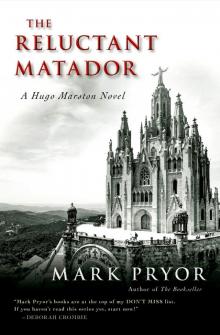 Hugo Marston 04 - The Reluctant Matador
Hugo Marston 04 - The Reluctant Matador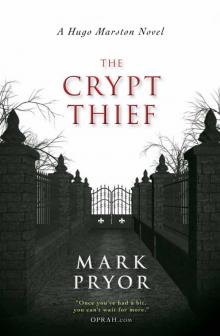 The Crypt Thief
The Crypt Thief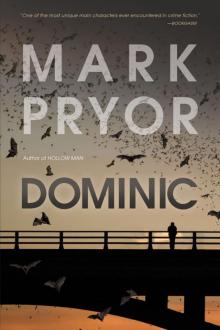 Dominic
Dominic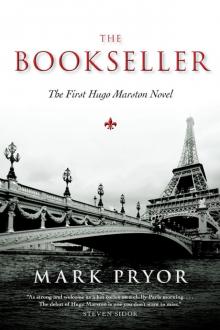 The Bookseller
The Bookseller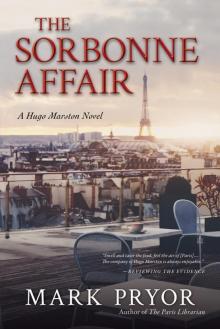 The Sorbonne Affair
The Sorbonne Affair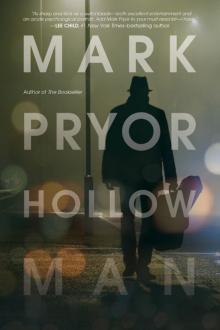 Hollow Man
Hollow Man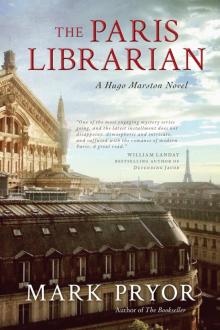 The Paris Librarian
The Paris Librarian